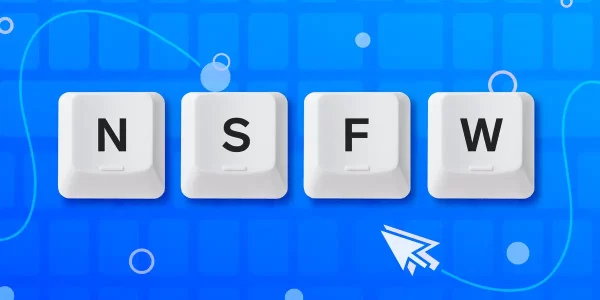Introduction
In today’s digital age, we encounter a plethora of abbreviations and acronyms that have become a part of our online vocabulary. One such acronym that you may have come across is NSFW. But what does NSFW mean? In this article, we will delve into the meaning of NSFW and explore how it is used in various contexts. Whether you’re a seasoned internet user or just getting started, understanding NSFW is crucial for navigating online content responsibly. So, let’s dive in!
Understanding NSFW
NSFW is an abbreviation for “Not Safe for Work.” It serves as a warning label to indicate that certain content contains explicit or inappropriate material that may be unsuitable for viewing in professional or public settings. The term is predominantly used in online environments, such as social media platforms, forums, and email communications.
Origins of NSFW
The term NSFW originated from the need to distinguish between content that is appropriate for work-related environments and content that is explicit or potentially offensive. It emerged as a means to protect individuals from accidentally encountering objectionable material while browsing the internet.
Common Usage of NSFW
NSFW is commonly used as a cautionary label for various types of explicit content, including but not limited to:
- Explicit Images and Videos
Explicit images and videos that contain nudity, sexual acts, or graphic violence are often labeled as NSFW. This warning helps individuals exercise discretion and decide whether they should view the content based on their personal preferences and the environment they are in.
- Profane or Offensive Language
Textual content that contains profanity, hate speech, or derogatory remarks may also be labeled as NSFW. This label is particularly useful in online discussions or forums where individuals may have different tolerance levels for explicit language.
- Sensitive or Disturbing Topics
Content that discusses sensitive or disturbing topics such as violence, abuse, or self-harm can be labeled as NSFW. This warning allows individuals to make an informed decision about whether they are emotionally prepared to engage with such content.
- Adult-oriented or Explicit Discussions
Discussions or conversations related to adult-oriented topics, including explicit sexual content, may be labeled as NSFW. This helps create a safe environment for individuals who wish to avoid or limit their exposure to such discussions.
Etiquette and Using NSFW Responsibly
When using NSFW labels, it is important to exercise responsible judgment and adhere to certain etiquette guidelines. Here are a few points to keep in mind:
- Use NSFW labels sparingly and only when necessary.
- Clearly communicate the reason for labeling content as NSFW to avoid confusion or misunderstandings.
- Respect the boundaries and preferences of others when sharing or discussing potentially sensitive content.
- Avoid using NSFW content to harass, intimidate, or offend others.
- Be mindful of the platform’s policies and guidelines regarding NSFW content.
NSFW in Different Online Platforms
Different online platforms have their own rules and guidelines regarding NSFW content. While some platforms strictly prohibit explicit content, others have dedicated sections or tags to separate NSFW content from general content. It is essential to familiarize yourself with the platform’s policies to ensure compliance and responsible usage.
NSFW and Content Filtering
Content filtering tools and software play a crucial role in managing NSFW content. Organizations and individuals can utilize these tools to restrict access to explicit material in work or family environments. Content filtering helps create a safer browsing experience and minimizes the risk of exposure to inappropriate content.
NSFW and Privacy Concerns
Privacy concerns often arise when sharing or accessing NSFW content. Users should exercise caution and consider the potential implications of sharing explicit material. It is essential to respect the privacy and consent of individuals involved in such content and to be mindful of the potential consequences of sharing without their permission.
Managing NSFW Content at Work
Many workplaces have strict policies regarding the viewing and sharing of NSFW content. Employees should familiarize themselves with their organization’s guidelines to maintain a professional work environment. It is crucial to exercise discretion and avoid accessing or sharing NSFW content during work hours or using company resources.
NSFW and Parental Controls
Parents and guardians often employ parental control tools and settings to protect children from accessing inappropriate content. These tools allow them to filter or block NSFW material, ensuring a safer online experience for their children. It is important for parents to actively monitor and discuss online safety with their children.
NSFW Alternatives and Variations
While NSFW is the most commonly used acronym, there are variations and alternatives employed to convey similar warnings. Some alternatives include “Not Safe for Life” (NSFL), “Not Safe for Anyone” (NSFA), and “Not Safe for Home” (NSFH). These variations often cater to specific contexts or intensify the warning associated with the content.
Consequences of Sharing NSFW Content
Sharing NSFW content without the consent of those involved or in inappropriate contexts can have serious consequences. Legal implications, damage to personal and professional reputation, and strained relationships are some of the potential outcomes. It is crucial to consider the potential consequences before sharing explicit material.
NSFW in the Context of Internet Culture
NSFW has become an integral part of internet culture, often used humorously or ironically. Memes, jokes, and other forms of online content frequently employ the NSFW label for comedic effect. However, it is important to remember that the underlying purpose of NSFW is to warn individuals about explicit or potentially offensive content.
NSFW and Legal Implications
Sharing or accessing explicit content may have legal implications, depending on local laws and regulations. Distribution of explicit material without proper authorization can lead to legal consequences such as fines, lawsuits, or criminal charges. It is essential to understand and comply with relevant laws when dealing with NSFW content.
NSFW: Educating and Raising Awareness
Educating individuals about the meaning and usage of NSFW is vital for fostering a responsible online community. By raising awareness, we can help individuals make informed decisions, respect boundaries, and create a safer online environment for everyone.
Conclusion
In conclusion, understanding NSFW is essential for navigating the vast digital landscape. The acronym “Not Safe for Work” serves as a cautionary label for explicit or inappropriate content. By using NSFW responsibly, exercising discretion, and respectingthe boundaries of others, we can ensure a safer and more inclusive online experience. Remember to always be mindful of the context in which NSFW content is shared and to consider the potential consequences before engaging with or distributing such material.
Frequently Asked Questions
- Is NSFW content only limited to explicit images and videos?
NSFW content encompasses a wider range of explicit or inappropriate material, including explicit discussions, profane language, and sensitive topics. It is not limited solely to images and videos.
- Can NSFW content be shared on social media platforms?
Social media platforms have their own guidelines regarding NSFW content. Some platforms strictly prohibit explicit material, while others provide specific features or tags to separate NSFW content from general content. Familiarize yourself with the platform’s policies before sharing NSFW content.
- Are there alternatives to the NSFW acronym?
Yes, there are alternatives such as NSFL (Not Safe for Life), NSFA (Not Safe for Anyone), and NSFH (Not Safe for Home). These variations cater to specific contexts or intensify the warning associated with the content.
- What are the legal implications of sharing NSFW content?
Sharing explicit content without proper authorization may have legal implications, depending on local laws and regulations. It is important to understand and comply with relevant laws to avoid potential fines, lawsuits, or criminal charges.
- How can I protect my children from NSFW content?
Employing parental control tools and settings is a recommended approach to protect children from accessing NSFW content. These tools allow you to filter or block explicit material, ensuring a safer online experience for your children. Additionally, actively monitoring and discussing online safety with your children is crucial.














Be First to Comment